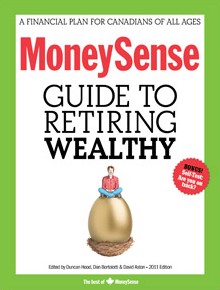When a million isn’t enough
While it may take a million in capital to generate $40,000 a year in passive investment income, a "retirement business" can generate that much income with much less capital: the difference being of course your own ongoing sweat equity.
 Like Rodney Dangerfield, a million bucks just doesn’t get much respect these days in retirement circles. Earlier this week, I noticed two separate stories on the web that questioned the likelihood a million dollars would be enough to retire on—or as this blog would argue, establish a modicum of financial independence.
In this Canadian Press piece that ran in the Globe & Mail, it was asserted that it now takes $1 million in investments to generate the same retirement income as a mere $500,000 would have yielded five years ago. We all know why: stock returns are volatile and too often negative since the financial crisis hit in 2008. And those who try to find a safe harbour in fixed income have been crucified with miniscule interest rates, which are the result of central bank actions around the world responding to that same seemingly chronic crisis.
Like Rodney Dangerfield, a million bucks just doesn’t get much respect these days in retirement circles. Earlier this week, I noticed two separate stories on the web that questioned the likelihood a million dollars would be enough to retire on—or as this blog would argue, establish a modicum of financial independence.
In this Canadian Press piece that ran in the Globe & Mail, it was asserted that it now takes $1 million in investments to generate the same retirement income as a mere $500,000 would have yielded five years ago. We all know why: stock returns are volatile and too often negative since the financial crisis hit in 2008. And those who try to find a safe harbour in fixed income have been crucified with miniscule interest rates, which are the result of central bank actions around the world responding to that same seemingly chronic crisis.
 Certainly as I comb through back issues of MoneySense, a million dollars has usually been considered more than enough capital to generate a livable sum in retirement. See for example the newly updated edition of the MoneySense Guide to Retiring Wealthy. Chapter Six is entitled “Sweet Freedom,” (a phrase that may ring a bell for subscribers as of the current Freedom Now! issue of the magazine). One article in that guide is titled “How we retired in luxury on $2,000 a month.”
Certainly, anyone with a half-decent employer pension will have that much, or will if they reach their 60s and qualify for some combination of the Canada Pension Plan and Old Age Security. It’s those who lack any sort of employer pension who tend to worry about whether a million dollars is enough to last into advanced old age.
Certainly as I comb through back issues of MoneySense, a million dollars has usually been considered more than enough capital to generate a livable sum in retirement. See for example the newly updated edition of the MoneySense Guide to Retiring Wealthy. Chapter Six is entitled “Sweet Freedom,” (a phrase that may ring a bell for subscribers as of the current Freedom Now! issue of the magazine). One article in that guide is titled “How we retired in luxury on $2,000 a month.”
Certainly, anyone with a half-decent employer pension will have that much, or will if they reach their 60s and qualify for some combination of the Canada Pension Plan and Old Age Security. It’s those who lack any sort of employer pension who tend to worry about whether a million dollars is enough to last into advanced old age.
 Rather than amass multi-millions for a traditional full-stop retirement, they save enough money for a five-year global odyssey. This turns out to be an experience that so changes their lives that they discovered new ways to generate income that precluded the need to do it all on passive investments. It may not be the “permanent vacation” I mention in the editor’s note in the current edition, but it’s an excellent start, especially if you’re worried a million won’t last a lifetime.
As the article noted and as I retweeted, “True wealth is control over your time and how you spend it.”
P.S. After this blog was published, USA Today had an article touching on this topic of boomers toiling into their 70s. You can read it here.
Rather than amass multi-millions for a traditional full-stop retirement, they save enough money for a five-year global odyssey. This turns out to be an experience that so changes their lives that they discovered new ways to generate income that precluded the need to do it all on passive investments. It may not be the “permanent vacation” I mention in the editor’s note in the current edition, but it’s an excellent start, especially if you’re worried a million won’t last a lifetime.
As the article noted and as I retweeted, “True wealth is control over your time and how you spend it.”
P.S. After this blog was published, USA Today had an article touching on this topic of boomers toiling into their 70s. You can read it here.











